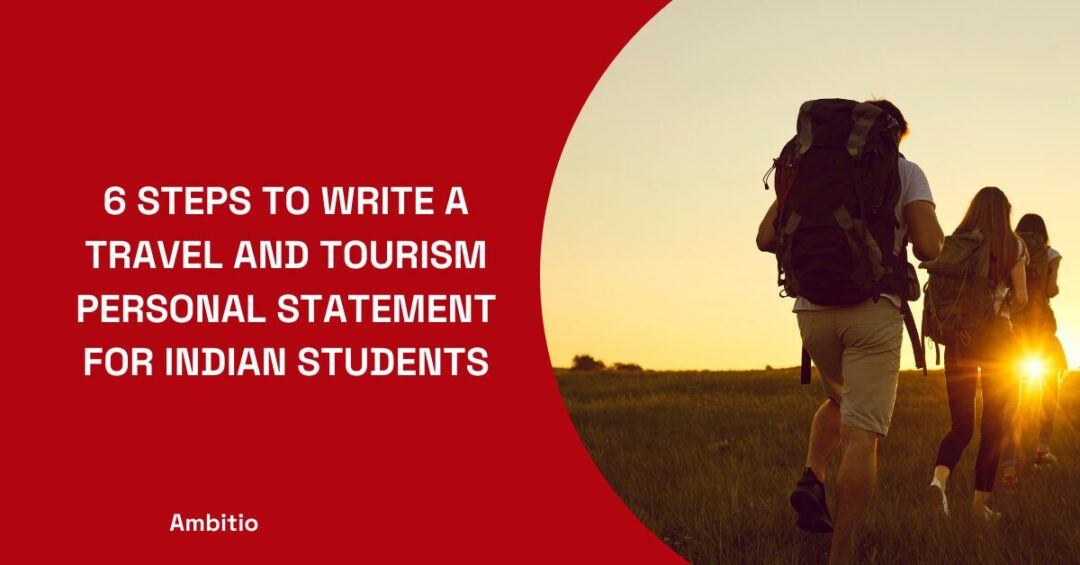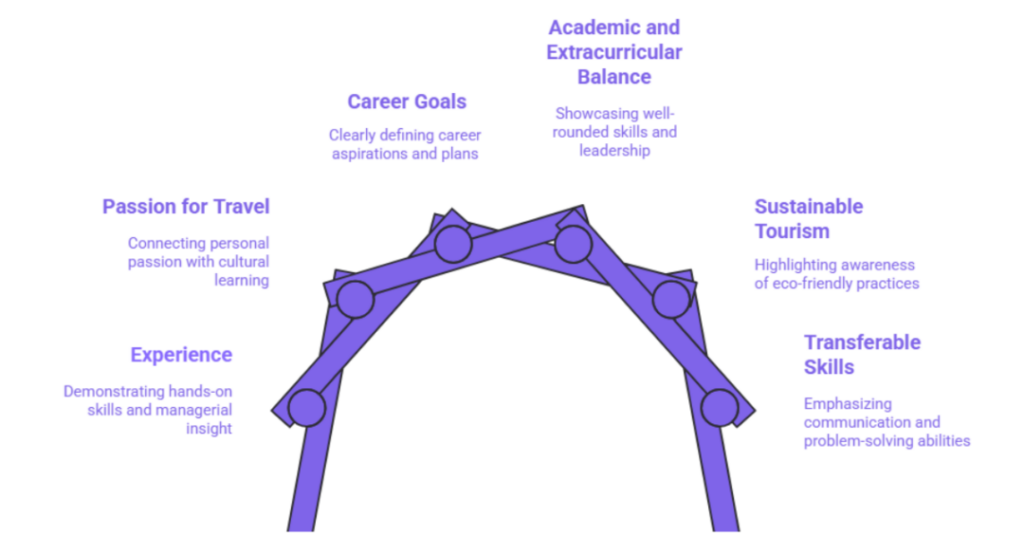20 May 2025
6 minutes read
6 Steps To Write A Travel And Tourism Personal Statement For Indian Students

Key Takeaways
- Write a travel and tourism personal statement that reflects real experience, career focus, and personal insight—not just love for travel.
- Stand out from 70,000+ applicants by clearly linking your skills, goals, and values to the tourism and hospitality industry.
- Submit the right supporting documents early, from transcripts to proof of funds, to stay ahead in the admission process.
Did you know over 70,000 students apply each year to study travel and tourism programs, many dreaming of exploring the world abroad? Yet, most of them stumble at the first hurdle—writing a personal statement that actually stands out on UCAS. It’s not just about bragging; it’s about proving why you belong in this competitive field.
Most applicants write vague, cookie-cutter statements that get lost in the pile. No personality, no focus, just empty fluff. If you want to break that cycle, you need a personal statement that’s sharp, real, and tailored—not just generic “I love travel” nonsense. The good news? Crafting one is totally doable if you know the right steps.
1. Highlight Relevant Work Experience Beyond the Usual
Don’t just list any job—show how your work experience in the tourism and hospitality sector gave you hands-on skills. Whether it was organizing tours at a travel agency or helping in a hotel’s hospitality industry, explain how these roles gave you managerial insight and sharpened your organizational and problem-solving abilities. Admissions want to see you’ve already started building a successful career foundation in the tourism sector.

2. Connect Your Passion for Travel to Real Learning, Not Just Hobbies
Everyone claims a passion for travel, but few explain what that means beyond a hobby. Use your statement to discuss how studying travel and experiencing different countries opened your eyes to different cultures and helped you connect with people from different backgrounds. This shows you’re not just a traveller but someone eager to broaden your horizons and gain insight into the global travel industry.
3. Make Your Statement of Purpose Crystal Clear on Career Goals
A strong statement talking about why you want to pursue a career in tourism matters. Go beyond vague ambitions; be specific about your career goals and how a tourism degree or study hospitality program fits into your plan. Whether it’s aiming for a career within sustainable tourism or planning to lead an organisation in the tourism sector, clarity sells your focus and determination.
4. Showcase Your Academic and Extracurricular Balance
Admission panels look for candidates who are not just academically strong but also well-rounded. Mention relevant extracurricular activities, especially those that highlight leadership skills, effective communication, or an entrepreneurial spirit—qualities that transfer well to business administration roles in tourism. This shows you’re not just book-smart but ready for the breadth of challenges the sector demands.
5. Demonstrate Understanding of Sustainable and Modern Tourism
Don’t ignore the rising importance of sustainable tourism. Discuss any experience or interest you have in this critical specific aspect of the tourism industry. Whether it’s promoting eco-friendly travel or supporting local communities, showing awareness of the global shift towards sustainable practices proves you’re up-to-date and ready to contribute meaningfully to the sector’s future.
6. Emphasize Transferable Skills and Your Desire to Learn
Travel and tourism require you to be outgoing, inquisitive, and eager to learn continuously. Highlight transferable skills like effective communication, organisational talent, and problem-solving, which are crucial in a sector involving people from different walks of life. Stress your desire to learn and grow—this mindset is what turns a qualification into a truly fulfilling and adaptable career path.
What Are The Other Documents Required For A Masters In Tourism And Hospitality?
Sure, you nailed your personal statement—convinced them you’re the next big thing in tourism and hospitality. But guess what? The university doesn’t just want your charm and passion; they want to see you’ve got your paperwork game on point too. It’s like booking a flight—if you forget your passport, no amount of sweet talk gets you on the plane.
So, get ready to assemble the full dossier to prove you’re serious about that degree in tourism and ready to jump into the hospitality industry headfirst.
| Document Name | Purpose | Key Tips |
|---|---|---|
| Academic Transcripts | Proof of your degree level qualifications and academic performance. | Get official transcripts covering all relevant studies, especially any tourism course or related subjects. |
| CV/Resume | Showcases your work experience and extracurricular activities relevant to the sector. | Highlight any roles in travel industry, travel agency, or hospitality industry. |
| Letters of Recommendation | Letter of recommendation validate your skills, character, and potential from professors or employers. | Choose referees familiar with your organisational and leadership skills. |
| Passport Copy | Confirms your identity and nationality for international travel and visa processing. | Make sure it’s valid for the entire duration of your studies and stay abroad. |
| Proof of English Proficiency | Required for non-native speakers to show you can handle academic English. | IELTS, TOEFL, or equivalent scores accepted by the institution. |
| Statement of Purpose | A statement of purpose is your detailed, focused explanation of why you want to pursue a career in the tourism sector. | This complements your personal statement by drilling down into your career goals and motivations. |
| Financial Documents | Evidence you can fund your studies and living expenses. | Bank statements, scholarship award letters, or sponsor letters. |
| Scholarship Application (if any) | If applying for financial aid, submit any additional forms required. | Tailor your statement talking about how funding will help you build a successful career. |
Travel And Tourism Personal Statement Example That Works For Everyone
When you try to write a travel and tourism personal statement from scratch? That’s like booking a trip without a map—possible, but you’ll probably get lost. Looking at a strong example lets you see how to blend your work experience, genuine passion for travel, and clear career goals into a statement that admissions actually want to read. It’s not about copying; it’s about understanding how to tell your story with honesty and focus.
I’ve always been hooked on exploring new places and meeting people from different backgrounds, but my work experience at a busy travel agency and volunteering in eco-tourism projects made me realize this isn’t just a hobby—it’s my future. Getting hands-on in the tourism and hospitality sectors taught me how crucial organisational skills and effective communication are when working in a global, fast-paced environment.
Studying a tourism course opened my eyes to the bigger picture—especially the need for sustainable tourism that respects both the environment and cultures. Traveling across different countries fueled my passion for travel and sharpened my desire to pursue a career where I can blend business administration with real-world impact.
I’ve also developed strong leadership skills and an entrepreneurial mindset through organizing community events and managing projects. These experiences taught me how to solve problems and work efficiently—skills that are transferable and essential in the evolving tourism industry and hospitality sector.
This degree in tourism will equip me with the academic knowledge and practical tools to build a successful career in the tourism sector. I’m eager to deepen my understanding, broaden my perspective, and connect with people from all walks of life while contributing to a more sustainable and responsible travel industry.
Conclusion
The admissions teams see right through generic fluff; they want candidates who understand the sector, have relevant experience, and clear goals. If you put in the effort to show that, you’re already a step ahead.
Remember, this is more than just a statement—it’s your first chance to prove you’re ready to build a meaningful career in a fast-changing world. So keep it honest, practical, and personal. The right mix of passion, skills, and insight will speak louder than any buzzword ever could.
Most applicants struggle to write a perfect personal statement but end up sounding arrogant — but you won’t. At Ambitio, our AI-powered study abroad experts help you craft a powerful, standout statement that gets noticed. No fluff, no clichés—just a compelling story that proves you belong. Schedule a call with Ambitio’s experts.
FAQs
What are the eligibility criteria for a master’s in Travel and Tourism abroad?
A bachelor’s degree in any discipline from a recognized university is typically required. Some programs may also prefer candidates with relevant work experience in tourism or hospitality, and proficiency in the language of instruction (usually English) is often necessary, demonstrated by tests like IELTS or TOEFL
Which countries are popular for studying Travel and Tourism at the master’s level?
Top destinations include the United States, United Kingdom, Australia, Canada, and Switzerland, known for their quality education and strong tourism industries
How long does it take to complete a master’s in Travel and Tourism abroad?
Most master’s programs in this field take one to two years to complete, depending on the country and university
What subjects are covered in a master’s in Travel and Tourism?
Typical subjects include tourism management, hospitality management, destination planning, marketing, sustainable tourism, event management, and tourism policy
Are internships or practical experiences part of the program?
Many programs include internships or practical training, often in renowned tourist destinations, to provide hands-on industry experience
What are the career prospects after completing a master’s in Travel and Tourism?
Graduates can work in hospitality management, travel agencies, tour operations, event management, destination marketing, tourism boards, airlines, and cruise companies
Is learning an additional language beneficial for this degree?
Yes, learning another language is highly beneficial, as the tourism industry is international and multilingual skills enhance employability and communication

You can study at top universities worldwide!
Get expert tips and tricks to get into top universities with a free expert session.
Book Your Free 30-Minute Session Now! Book a call now




























